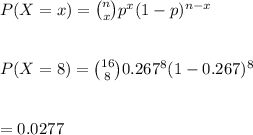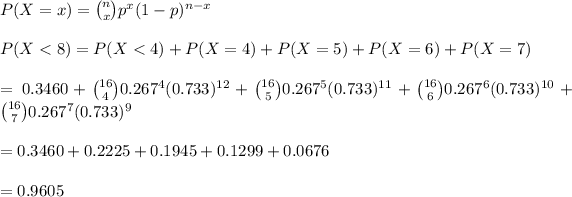Answer:
a. P(X=8)=0.0277
b. P(X<4)=0.3460
c. No. P(X<8)=0.9605
Explanation:
a. Let x denote the event.
This is a binomial probability distribution problem expressed as

Where
- n is the total number of events
- p is the probability of a success
- x is the number of successful events.
Given that n=16, p=0.267, the probability of exactly 8 people not covering their mouths is calculated as:

Hence, the probability of exactly 8 people not covering their mouths is 0.0277
b. The probability of fewer than 4 people covering their mouths is calculated as:
-We calculate and sum the probabilities of exactly 0 to exactly 3:

Hence, the probability of x<4 is 0.3460
c. Would you be surprised if fewer than half covered their mouths:
The probability of fewer than half covering their mouths is calculated as:

No. The probability of fewer than half is 0.9605 or 96.05%. This a particularly high probability that erases any chance of doubt or surprise.